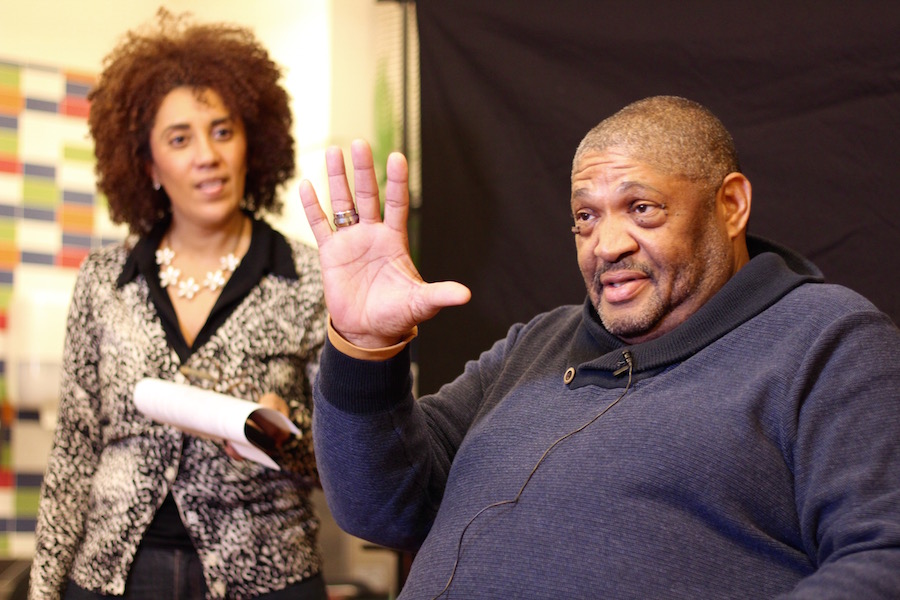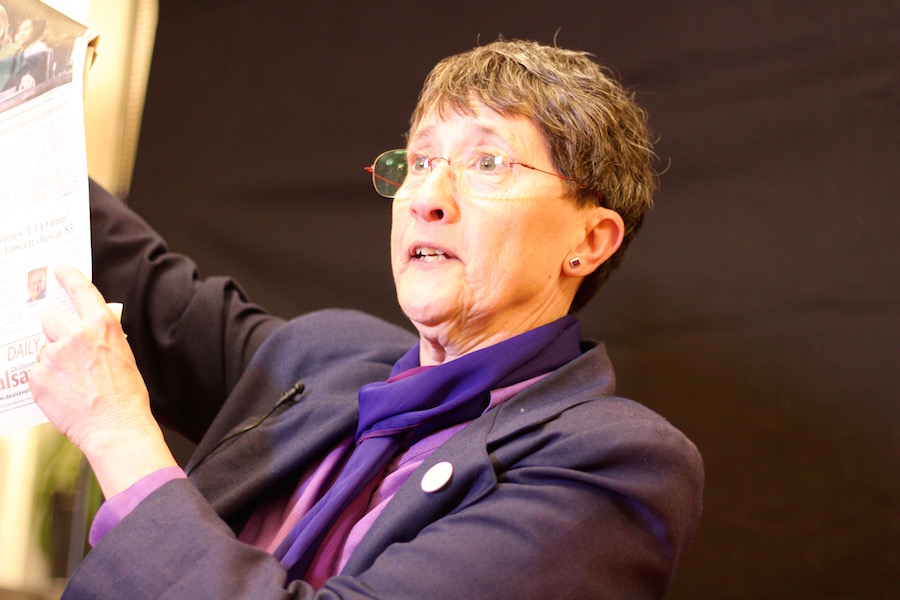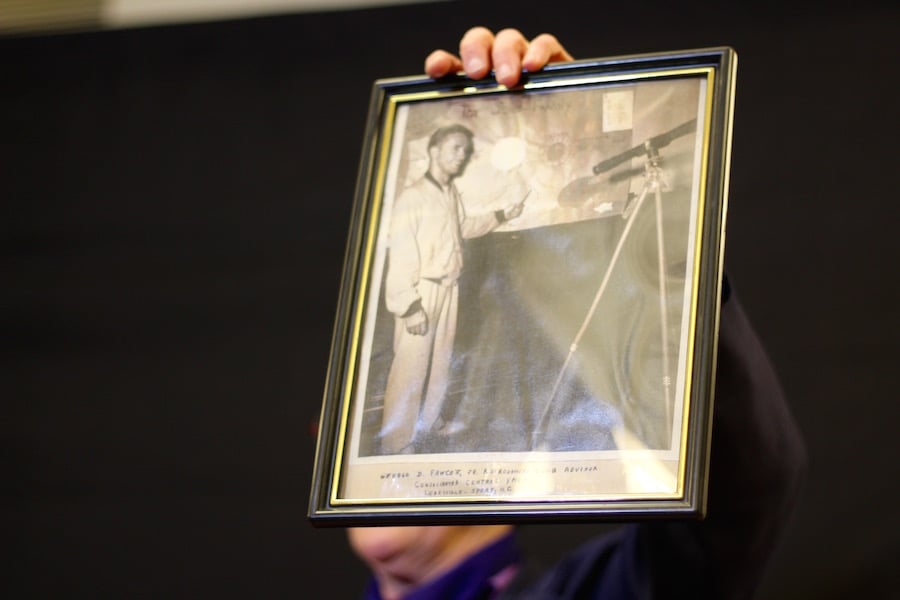
ConnCAT | Storytelling | Newhallville | Arts, Culture & Community

| Laura Fawcett. Lucy Gellman Photos. |
One father couldn’t stop talking about the other-worldly objects that populated his days and nights. The other called two places home, but learned to love one more deeply than the other. Their children ended up on the same storytelling stage on the same night, speaking both of them into being.
Monday night, that was the gist of Storytellers New Haven, held at the Connecticut Center for Arts & Technology (ConnCAT). The program, a monthly series intended to bring New Haveners together through their stories, began in November 2017 and is already looking ahead to its next season. Karen DuBois-Walton, who founded and runs the series with her husband Kevin Walton, joked that “there are 132,000 people in New Haven and we hope to tell at least that many stories.”
“The reality is sometimes we live and work and move through the city without really knowing each other,” she said. “It’s time to build community and make a new friend tonight.”
Fatherhood A Galaxy Away

The first father to take center stage was George Fawcett, a UFO investigator who died in North Carolina in 2013. In New Haven, his daughter Laura is a program manager with Literacy Volunteers, an organization that offers free literacy training to over 150 New Haveners per year. Monday, she transported the audience back to her father's childhood and time as a not-quite-family-man.
Fawcett’s father was born in Mount Airy, North Carolina, in 1929, one of two identical twin boys. During his small-town, southern upbringing—Mount Airy is best known as the birthplace of Andy Griffith, who based his show “Mayberry RFD” on the town—he became “a real World War Two buff,” obsessed with the progress of American forces overseas.
One story in particular stayed with him: the night in November 1944, when American troops spotted several bright mysterious lights over Strasbourg. By the time the Associated Press broke the story, the radar observer who had seen them was calling them “foo fighters.” The name stuck, and a then-teenage George kept a version of the article for the next 65 years of his life.
It marked the beginning of an interest in the paranormal that lasted for decades. In college, an adolescent George reported his first UFO sighting in Virginia. Then years later in the army, he reported another, while crossing the Panama Canal. At home, he worked at the local YMCA, running summer camps for local kids. It was a full-time, seven-day-a-week job, Fawcett recalled, “so we hardly ever saw him.”
“And frankly, when we saw him, he really wasn’t there,” she said. “His mind was up in the stars somewhere.”
At the very beginning of her life, Fawcett recalled, that didn’t seem like a problem. At night, the last thing she would see was her father in the backyard, peering up into space with a telescope. She had glow-in-the-dark stars on her bedroom ceiling to match the activity. Once, when the family was in Massachusetts, her father bundled her up and brought her outside during a snowstorm to see the aurora borealis, or Northern Lights.
“It reminded me of those ribbon candies at Christmas,” holding up a piece of paper that read “Wonder” like a sort of chapter marker for her story. “That’s what it looked like.”
But as Fawcett got older, her dad’s quirks started to seem a little more odd. He was constantly calling—and then visiting—New Hampshire residents Betty and Barney Hill, who claimed they had been abducted by aliens in 1961. She took note of odd bumper stickers on the family’s car, stating that “UFOs Are Real, The Air Force Doesn’t Exist” and “Earth Is Full, Go Home!”
Soon there was a UFO detector in the attic, with a giant megaphone at the top and wires running along the side. During thunderstorms, it would go off with no sign of stopping. One night, Fawcett’s mom got so angry with the noise it made that she threw it through an upstairs window, smashing the glass as it landed on the street below.
“In the 60s, my dad was considered at best a crackpot or a kook, and at worst a total lunatic,” she said. “In the mid-sixties … it was all he could talk about, all he could think about. He called it his magnificent obsession.”
But it was more than an obsession. He would talk straight at family members, cycling through dates and locations of UFO sightings around the globe. If someone wanted to change the subject or get a word in edgewise, they usually failed. It ushered in something she called “the Cold War,” a period of “simmering resentment” that grew between her mother, younger brother, father, and her.
“The simmering resentment grew into anger and rage at him among all three of us in the family,” she recalled. “And in my case, rage at the UFOs themselves … I didn’t give a damn if they existed or not. I despised them, because they took my father away from me.”
The Cold War lasted for years, pulling the family apart with an almost unearthly force. Fawcett’s mother divorced her father. Her brother, eight years her junior, stopped talking to him for the next 20 years. She stopped reading his letters, all recounting UFO sightings, and then stopped taking his calls. When her father remarried a fellow UFO enthusiast, even she got exhausted at his ramblings, once firing a warning shot above his head to make him stop talking.
But then she had second thoughts in her 20s. A counselor suggested that she reconcile, a suggestion she started to act on after dating someone who was “full of bitterness and resentment” about his own parents. As she began a relationship with her now-husband—who she saw listening often and intently to his own young daughter—she decided to give it a try.
“It took a lot to go back to North Carolina after five years,” she said, laughing. “I decided that I needed to do some homework.”
First, she tried recording her conversations with her dad, stopping the recorder and announcing “It’s my turn now!” as if he was in the room, and had been stilled to silence. But he caught on to the sound of the wiretap she was using—federal law requires that they beep intermittently—and hung up because he thought the FBI and Air Force were listening in.
She also took a meditation class at her church to “practice forgiveness,” drawing on the teachings of the Dalai Lama. At one session, a meditation teacher guided the class through an exercise where they were in the woods somewhere, an old figure hobbling toward them with a gift , “something that will help you forgive this person.”
In her mind’s eye, Fawcett saw the figure walking toward her. He dropped a cold, heavy silver bullet in her hand. It was a revelation—Fawcett’s paternal grandfather had committed suicide in 1945, on the day after Christmas.
No one talked about it in the family, but she knew that it had been horrible for her father and his brother. Then she thought of the foo fighters article, dated to the end of 1944. The two merged into a collective grief.
“What that began to make me think of was what a hole that had left in his life,” she said. “He became more and more obsessed as he grew up, he became a young man and then he grew older.”
Five years after she first stopped returning those calls, she headed back to North Carolina for some “close encounters of the third kind”—contact with the alien that was her father. It didn’t go exactly as she had planned: she would cut into the conversation, and her dad would just keep talking over her. She would set an egg timer for five minutes per person, and he would grow angry.
But Fawcett kept trying for 30 years, from the time she was 20 to the time she was 50. She was inspired, in part, by her now-husband Randy, a church caretaker who listened to his young daughter. Monday, she recalled how he knew the name of every single one of his daughter’s dolls and toy ponies, totally invested in her internal world.
“It was the idea that the father would be listening to the child that just seemed so extraordinary to me,” she said. “It seemed like—what planet am I on? This is so different … that’s when I knew that that’s what I wanted with my father. I wanted that level of equal attention.”
She got it in a way she never expected. In 2005, Fawcett’s dad had to have knee replacement surgery, for which she headed back to North Carolina. She hired a night nurse to care for him in the hospital afterward, because “I knew the kind of things he might talk about would be real triggers for a psychotic break or something. Little green men, all that stuff.”
She warned the night nurse that her dad might emerge from his sleep with stories of “alien abductions, alien autopsies, cattle mutilations ... men in black,” and more. When she got there in the morning, she found not only a grateful nurse—he thanked her for the warning—but a dad who believed that his greatest life dream had been realized—that he had in fact been abducted by aliens himself.
“He looked at me when I walked in, and he said ‘Laurie! They took you too,’” she recalled to laughs. “He said ‘they did surgery on me, and now they’re taking sperm samples.’”
But Fawcett’s father never totally emerged from the anesthesia either. He developed dementia, sliding slowly into forgetting who he was. For her, it was an unexpected chance to reconcile further: the final 10 years of his life marked “an increasingly positive relationship that had nothing to do with UFOs.”
As he forgot who he was, Fawcett found herself helping him remember. Before his death, he would ask her to help him walk back through the past, listing off the places the family had lived, the people he’d known. At the end of those conversations, he would stop her—she was now doing a lot more of the talking—to cut in.
“Thank you for giving my life back to me,” he said.
A Tale Of One Dad, Over Two Cities

As Fawcett slipped back to her seat, a packed room welcomed Bruce Trammell, a father of five and the oldest of nine kids. Now a fatherhood coach in New Haven—he’s known around town as “the fatherhood guy”—Trammell transported the audience to New York City, traveling between the two places that first defined his father’s life, and then defined his.
In the early 1960s, Trammell was a young kid, growing up in Brooklyn. On his maternal side, he recalled, “I was born into basically my grandfather’s house,” a Brooklyn brownstone where he spent time with parents, aunts, uncles and grandparents, getting doted on as the eldest grandchild. As he got older, his parents moved into their own place in the city, sending Trammell to school for the first time.
“Brooklyn was like a magical place, because I got to experience being a kid at a time when it was like good to be a kid,” he recalled. “People respected the idea that we were kids and they let us have a little bit of expression, even though you had to know your place too at the same time.”
But Trammell was also sick a lot as a kid—he had chronic bronchitis, which public health workers and doctors have since linked to the city’s air quality. At some point, his dad started talking about a place called Connecticut, where there were trees and public green spaces, and playgrounds instead of sidewalks where kids could play. He told Trammell that the family was going to move there to cure his bronchitis.
Suddenly, Trammell learned, one person could lay claim to two towns. He looked to his dad, who assured him that the move would go smoothly and improve his health.
“That was just the reason he told me,” Trammell said to laughs. “The whole thing was that he moved to New Haven because his family was in New Haven, and jobs were in New Haven.”
But in New Haven, he found himself caught between identities again. Brooklynite and New Havener. Eldest sibling and the one who was also locked out of his siblings' seeming code to each other. While they spoke pig latin amongst each other—a skill that Trammell joked helped him understand the way his four daughters now speak in code—he was trying to discover the city, looking to his dad for advice.
He gave it by showing his son how to grow roots in a place, and urging him to take chances on a city he hardly knew. When Trammell was in middle school, a representative of the then-nascent Ulysses S. Grant Program talked to his parents about the burgeoning partnership between Yale and New Haven. If he enrolled, the representative explained, Trammell could spend time on Yale’s campus, and ultimately attend an Ivy League university. Initially, they said yes.
“It was wonderful,” he recalled. “You couldn’t tell me that I didn’t go to Yale. Because access was everything. We ate lunch there in the summertime, we did projects, I learned about photography. It was a great thing.”
But one year in, Trammell’s parents decided they didn’t want him to go to college, pulling him from the program to attend trade school. There was initial resentment, he said during a brief question-and-answer session after his story—he had planned to be a doctor, lawyer, or accountant during that year on Yale's campus. Instead, he looked to back to his dad, and found a vocation.
He became an auto mechanic, inspired by years of watching his dad repair antennas and fix broken items around the house. At graduation, he recalled, he received a diploma naming him a "Doctor of Motors."
"I worked surgery on a car, bring it back to life," he said to peals of laughter from the room.
What helped most during that time, he continued, weren't his new colleagues, who would take him out to chat after they'd finished a shift and before they headed home to sleep. It was watching his dad—”a Harlem boy, but he had Virginia roots”—to navigate two different worlds himself, and learning from his example.
For his entire life, his dad had been a die-hard New York sports fan. It could be any sport, Trammell recalled—if it was a New York team, his dad was in. And yet as grew the family in New Haven, he watched his dad’s verve for New York melt away, focused on digging into New Haven as his life and family unspooled around him.
“I never really thought that he would take it up, and own up to living here,” Trammell said. “But he did. And I saw the transformation that he had with moving to Connecticut and accepting Connecticut, and understanding that this was the place where he belonged and he lived.”
“So I learned that from him. And I became what he was,” he added. “And I accepted the tale of both of my cities.”

